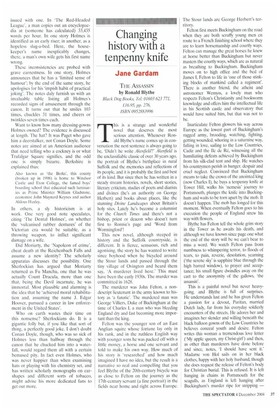Changing history with a tenpenny knife
Jane Gardam
THE ASSASSIN by Ronald Blythe Black Dog Books, Tel: 01603 623 771, £16.95, pp. 276, ISBN 0952883996 This is a strange and wonderful novel that deserves the most serious attention. Whenever Ron ald Blythe's name comes up in conversation the next sentence is always going to be, 'Didn't he write Akenfield?' Akenfield is the unclassifiable classic of over 30 years ago, the portrait of Blythe's birthplace in rural Suffolk and the memories and reflections of its people, and it is probably the first and best of its kind. But since then he has written in a steady stream histories, novels, short stories, literary criticism, studies of poets and diarists and divines (he's an authority on George Herbert) and books about places, like the stunning Divine Landscapes about Britain's holy sites. Lately he's become a columnist for the Church Times and there's not a bishop, priest or deacon who doesn't turn first to Ronnie's page and 'Word from Wormingfordl
This new novel, although steeped in history and the Suffolk countryside, is different. It is fierce, sensuous, rich and agonising, the story he has wanted to write since boyhood when he bicycled around the Stour lands and passed through the tiny village of Ovington and heard them say, 'A murderer lived here.' This must have been the early 1930s. The murder was committed in 1628.
The murderer was John Felton, a nondescript lieutenant in the army known to history as 'a fanatic'. The murdered man was George Villiers, Duke of Buckingham at the time of Charles 1, a man who was bleeding England dry and fast becoming more important than the king.
Felton was the younger son of an East Anglian squire whose fortune lay only in his rank, and in the ruthless English way with younger sons he was packed off with a little money, a horse and one servant and told to make his own way. How much of his story is 'researched' and how much imagined I have no idea, but the result is a narrative so real and compelling that you feel Blythe of the 20th-century bicycle was as close to Felton on the journey as the 17th-century servant (a fine portrait) in the fields near home and right across Europe. The Stour lands are George Herbert's territory.
Felton first meets Buckingham on the road when they are both scniffy young men en route to a French finishing school where they are to learn horsemanship and courtly ways. Felton can manage the great horses he knew at home better than Buckingham but never masters the courtly ways, which are as natural as breathing to Buckingham. Buckingham moves on to high office and the bed of James I, Felton to life in 'one of those stinking blocks of mankind called a regiment'.
There is another friend, the atheist and astronomer Wernyss, a lovely man who respects Felton's Christianity and bookworm knowledge and offers him the intellectual life in his Scottish castle and observatory that would have suited him, but that was not to be.
Inarticulate Felton glowers his way across Europe as the lowest part of Buckingham's ragged army, brooding, watching, fighting,
getting wounded, whoring in a saturnine way, falling in love, sailing to the Low Countries,
Cadiz and the Ile de Re, witnessing all the humiliating defeats achieved by Buckingham from his silk-clad tent and ship. He watches his countrymen perish in hunger, despair and cruel neglect. Convinced that Buckingham means to take the crown of the anointed king (now Charles I), he buys a tenpenny knife at Tower Hill, walks his 'nemesis' journey to Portsmouth, plunges the knife into Bucking ham and waits to be torn apart by the mob. It doesn't happen. The mob has longed for this moment. When eventually Felton goes to his execution the people of England strew his way with flowers.
Blythe has Felton tell the whole grim story in the Tower as he awaits his death, and although we have known since page one what the end of the story will be we can't bear to miss a word. We watch Felton pass from numbness to whimpering terror, to floods of tears, to pain, reverie, desolation, yearning (`the serene sky' is sapphire blue through the
high barred window), to prayer and acceptance; his small figure dwindles away on the cart to the anonymity of the gallows, 'the assassin'.
This is a painful novel but never heavygoing, and Blythe is full of surprises.
He understands lust and he has given Felton a passion for a devout, Puritan, married Dutch lady, far from his everyday soldierly encounters of the streets. He adores her and imagines her slender and willing beneath the black balloon gowns of the Low Countries he believes conceal youth and desire. Felton writes this woman a tremendous love letter ('My apple queen, my Christ-girl') and then, as other than murderers have done before and since, notes, 'I should have sent it.' Madame von Hol sails on in her black clothes, happy with her holy husband, though she does request the release of Felton's body for Christian burial. This is refused. It is left hanging in chains in Portsmouth for the seagulls, as England is left hanging after Buckingham's murder ripe for stripping — the king's execution. Cromwell, the civil wars. Felton's act changed history.
His and Blythe's beautiful Stour lands survive. Blythe has said somewhere that the English countryside always recovers in the end; 'only man is vile'.



















































































 Previous page
Previous page